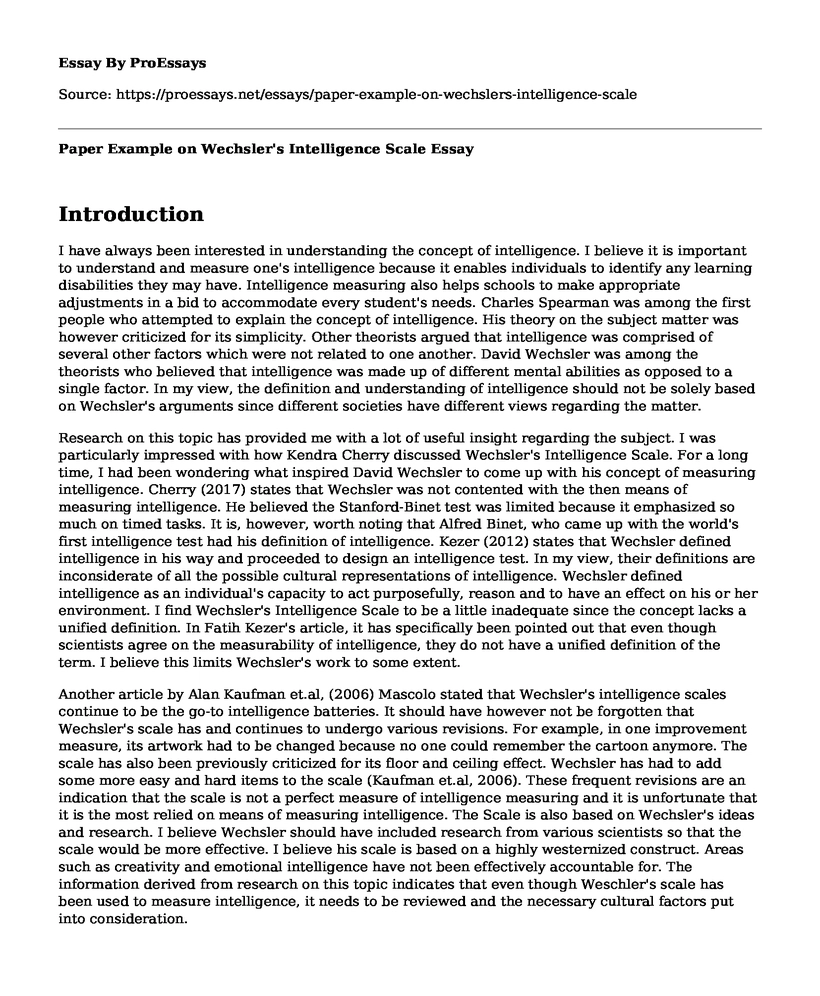Introduction
I have always been interested in understanding the concept of intelligence. I believe it is important to understand and measure one's intelligence because it enables individuals to identify any learning disabilities they may have. Intelligence measuring also helps schools to make appropriate adjustments in a bid to accommodate every student's needs. Charles Spearman was among the first people who attempted to explain the concept of intelligence. His theory on the subject matter was however criticized for its simplicity. Other theorists argued that intelligence was comprised of several other factors which were not related to one another. David Wechsler was among the theorists who believed that intelligence was made up of different mental abilities as opposed to a single factor. In my view, the definition and understanding of intelligence should not be solely based on Wechsler's arguments since different societies have different views regarding the matter.
Research on this topic has provided me with a lot of useful insight regarding the subject. I was particularly impressed with how Kendra Cherry discussed Wechsler's Intelligence Scale. For a long time, I had been wondering what inspired David Wechsler to come up with his concept of measuring intelligence. Cherry (2017) states that Wechsler was not contented with the then means of measuring intelligence. He believed the Stanford-Binet test was limited because it emphasized so much on timed tasks. It is, however, worth noting that Alfred Binet, who came up with the world's first intelligence test had his definition of intelligence. Kezer (2012) states that Wechsler defined intelligence in his way and proceeded to design an intelligence test. In my view, their definitions are inconsiderate of all the possible cultural representations of intelligence. Wechsler defined intelligence as an individual's capacity to act purposefully, reason and to have an effect on his or her environment. I find Wechsler's Intelligence Scale to be a little inadequate since the concept lacks a unified definition. In Fatih Kezer's article, it has specifically been pointed out that even though scientists agree on the measurability of intelligence, they do not have a unified definition of the term. I believe this limits Wechsler's work to some extent.
Another article by Alan Kaufman et.al, (2006) Mascolo stated that Wechsler's intelligence scales continue to be the go-to intelligence batteries. It should have however not be forgotten that Wechsler's scale has and continues to undergo various revisions. For example, in one improvement measure, its artwork had to be changed because no one could remember the cartoon anymore. The scale has also been previously criticized for its floor and ceiling effect. Wechsler has had to add some more easy and hard items to the scale (Kaufman et.al, 2006). These frequent revisions are an indication that the scale is not a perfect measure of intelligence measuring and it is unfortunate that it is the most relied on means of measuring intelligence. The Scale is also based on Wechsler's ideas and research. I believe Wechsler should have included research from various scientists so that the scale would be more effective. I believe his scale is based on a highly westernized construct. Areas such as creativity and emotional intelligence have not been effectively accountable for. The information derived from research on this topic indicates that even though Weschler's scale has been used to measure intelligence, it needs to be reviewed and the necessary cultural factors put into consideration.
References
Cherry, K. (2012, November 26). How Does the Weschsler Adult Intelligence Scale Measure Intelligence? Retrieved from https://www.verywellmind.com/the-wechsler-adult-intelligence-scale-2795283
Kaufman, A. S., Flanagan, D. P., Alfonso, V. C., & Mascolo, J. T. (2006). Wechsler Intelligence Scale for Children-IV (WISC-IV). SpringerReference. Retrieved from http://journals.sagepub.com/doi/10.1177/0734282906288389
Kezer, F. (2012). An Examination and Comparison of the Revisions of the Wechsler Intelligence Scale for Children. Procedia - Social and Behavioral Sciences, 46, 2104-2110. doi:10.1016/j.sbspro.2012.05.436
Cite this page
Paper Example on Wechsler's Intelligence Scale. (2022, Jul 04). Retrieved from https://proessays.net/essays/paper-example-on-wechslers-intelligence-scale
If you are the original author of this essay and no longer wish to have it published on the ProEssays website, please click below to request its removal:
- Research Paper on Emotions: Anger vs. Contentment
- Paper Example on Personality in Relation to Leadership Behavior
- Mental and Nervous System Disorders Paper Example
- Essay on How Politicians Use Affect to Influence People's Emotions and Ideas
- Essay Sample on Stress: Benefits and Detriments to Mental and Physical Health
- John's Recurrent Depression: A Perfectionist's Undue Burden - Essay Sample
- Free Essay Example on Childhood vs. Adulthood: Cognitive & Social Development







